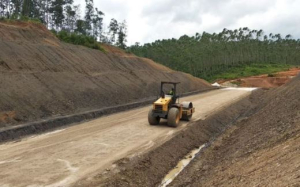Indonesia poised to lead regional CCS initiative: Expert
Indonesia has the potential to lead in Carbon Capture and Storage (CCS) technology in the Asia-Pacific region, with significant geological advantage of having an estimated storage capacity of up to 603 gigatons of carbon dioxide beneath its surface, an Expert says.
"This capacity allows Indonesia to store up to 1,000 years worth of its emissions and even accommodate regional carbon storage needs for approximately 200 years," Diofanny Swandrina Putri, Special Assistant to the Deputy Speaker of the People's Consultative Assembly (MPR) and Director of Indonesia & Regional CCS Strategic Initiative, said in a speech at the University of Indonesia in Depok, West Java on Thursday, March 6, 2025.
She cited that CCS is a crucial component of achieving net-zero emissions as it would be nearly impossible to meet global and national decarbonization targets without the technology.
The Intergovernmental Panel on Climate Change (IPCC) has suggested that CCS must be integrated into climate strategies to curb rising global temperatures below 1.5 degrees of Celsius.
The Indonesian government has been actively promoting CCS investment, recognizing its dual benefits, namely mitigating climate change and boosting economic growth. The initiative is projected to attract up to US$43 billion in investments, while creating 170,000 jobs per year in various hubs across the country.
While renewable energy sources remain a long-term goal, Putri noted that Indonesia must balance energy security with economic growth.
"We are still reliant on fossil fuels, but CCS allows us to use them responsibly while we transition to cleaner alternatives," she said.
Several major energy players, including Pertamina Hulu Energi, ExxonMobil, and BP, have already initiated CCS projects in Indonesia. These projects are expected to help industries in power generation, steel, cement, and ammonia production reduce their emissions effectively.
Addressing concerns about CCS safety, Putri assured that the technology has been proven secure in countries where it has been implemented since the 1990s.
"With rigorous monitoring and adherence to international standards, the risk of carbon leakage is less than 0.1 percent, making CCS a viable and essential solution," she said.
Indonesia’s CCS ambitions extend beyond environmental benefits. The country seeks to leverage CCS for geopolitical advantages, positioning itself as a key player in the global fight against climate change.
"By developing a regional CCS hub, Indonesia not only secures investments, but also strengthens its diplomatic standing as a climate leader in the Global South," Putri concluded.
Already have an account? Sign In
-
Start reading
Freemium
-
Monthly Subscription
30% OFF$26.03
$37.19/MonthCancel anytime
This offer is open to all new subscribers!
Subscribe now -
Yearly Subscription
33% OFF$228.13
$340.5/YearCancel anytime
This offer is open to all new subscribers!
Subscribe now






